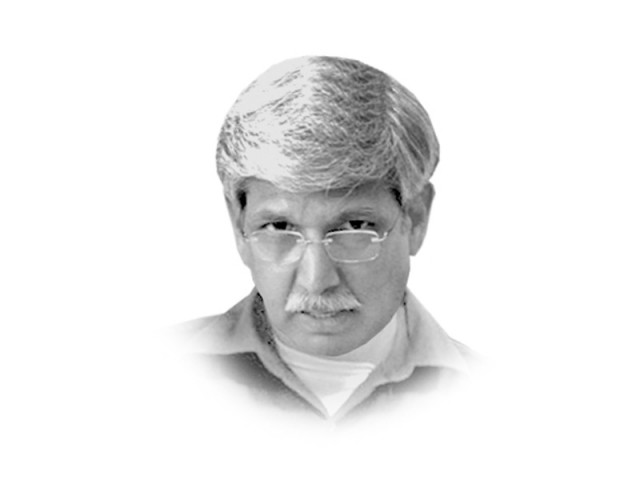The Parthasarathy doctrine
Parthasarathy says India let Pakistan off too easily in 1971, similarly again post-Mumbai especially with 'evidence'.

This is what he had to say immediately after the Mumbai attacks (I paraphrase, of course): “for the first time after 60 years, we have Pakistan under our thumb (Mumbai), with a living proof (Ajmal Kasab) that it is a state sponsoring terrorism; we should simply not let it go”. He has since gone on to remind India that it let Pakistan off too easily in 1971 after Pakistan had been comprehensively vanquished. Has this doctrine more or less guided Indian policy towards Pakistan in the post-Mumbai years? It most likely has and that is why I refer to his pronouncements as a doctrine.
In a recent discussion on an Indian TV channel at which I was present, I likened the Indian proclivity to hark back to Mumbai at the mere mention of Pakistan, to India “milking Mumbai”. It didn’t go down too well with my Indian colleagues since the three-and-a-half-year-old pain still seems real. Though it is not in their character, Indians persistently embellish that episode with emphatic sensitivity and as a great injustice that to them has still not found closure. No question on the morbidity that underwrote such heinous enactment, but even morbidity should find closure, especially if it involves two states whose past has a sad history of violence.
Novermber 26, 2008 is a reality. There had been a similar attack on the Indian parliament in 2001, and then a couple more in Kashmir. Pakistan has had its own share of similar embarrassing attacks on the GHQ and on the Mehran base in Karachi. Afghanistan is currently suffering through similar episodes of brief takeovers by militants of sensitive buildings for some hours, meant to embarrass security outfits. That doesn’t make the pain any less; just that it signifies the occurrences as common experience of these three nations as they fight off insurgencies and heinous episodes of terror emerging from multiple sources. They can do better by making coordinated efforts to fight this pervasive menace.
Zabiuddin Ansari, an Indian national, is alleged to have been the controller of the 10 men, who set sail for Mumbai. He carries a Pakistani passport, a Pakistani National Identity Card, as well as a NICOP, a National identity Card for Overseas Pakistanis. Usually, an overseas Pakistani will have only a NICOP; the fact that he had both, goes to prove that legalising him in Pakistani colours was a duplicitous undertaking. That doesn’t change the fact of his involvement but here are a few other things to consider. Ansari was apprehended at the Delhi airport; what passport did he travel on? Not his Pakistani passport for sure? His neighbours know him well and were aware of his presence in Saudi Arabia as is most common with Indians and Pakistanis who locate to the Gulf as economic migrants. He couldn’t have been missing for too long? Lamentably, the Pakistani mission in Saudi Arabia has been known for pilfering passports to illegal Pakistani migrants who are desperate to formalise an identity. A NICOP, too, can be had for some additional gratification. That can make travelling to Pakistan a piece of cake. It is crucial to determine who facilitated him with all this. That also leaves a lot of questions about who exactly were his handlers?
The other most quoted evidence is from David Headley, a naturalised American with both Pakistani and Indian antecedence, and a confirmed double agent. He claims to have been guided by the ISI at a certain time, while he is now accepted more as a CIA man protected under FBI ownership. Direct access to him has been denied to the Indians who have had to depend on whatever testimony was shared by the Americans. Such question of probity in his conduct has made his testimony seriously suspect. A Chicago court held his testimony against his former friend Tahhawur Rana — charged with abetting the Mumbai attacks — lightly and refused to implicate him in anything more serious than culpability of misplaced friendly enthusiasm. Question: was he also an Indian agent?
Ansari, along with Kasab, clearly have greater relevance to what happened on 26/11. If Ansari is found guilty, he must be sentenced to death. But Ansari and Kasab also carry plenty of information that needs to be extracted, not only by India, but by Pakistan too. That is only possible if Pakistan is given access to both, or be allowed to join a joint investigation. India proffering a few documents as evidence will not hold in any Pakistani court unless those prosecuting have direct access to the purported evidence — that remains the touchstone for any judicial process. Why should it be any different in this case?
Less said of the control room in Karachi as evidence of state culpability, the better. Mr P Chidambram considers this enough to vilify Pakistan. Given his acquired knowledge from delving in the telecom sector, he should know that such a facility can easily be established by any entity, not just the state.
It is time to take a leaf out of Pakistan’s decision to move forward with the US after Salala. It is time to move away from the Parthasarathy doctrine for a better future.
Published in The Express Tribune, July 12th, 2012.
















COMMENTS
Comments are moderated and generally will be posted if they are on-topic and not abusive.
For more information, please see our Comments FAQ